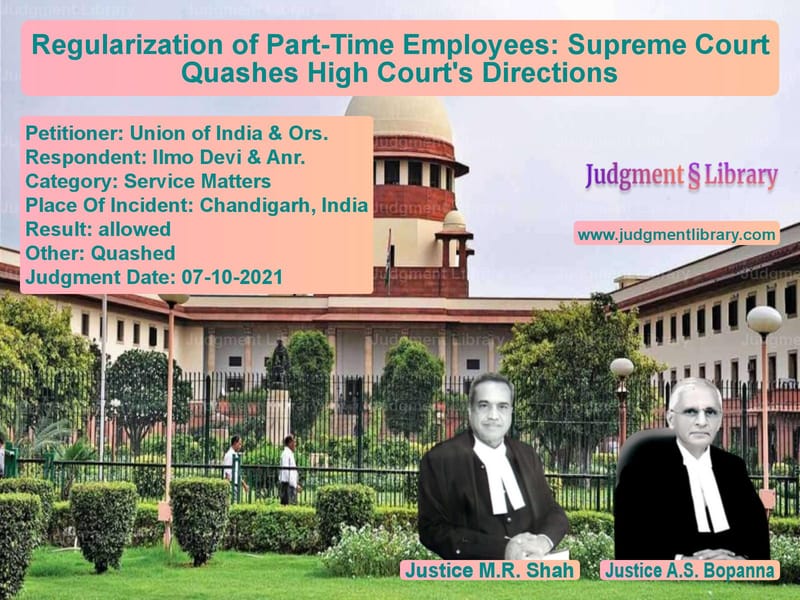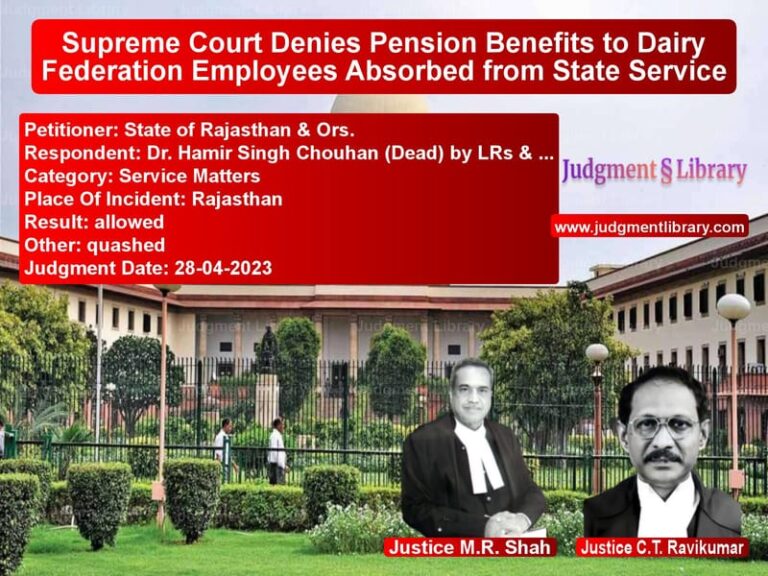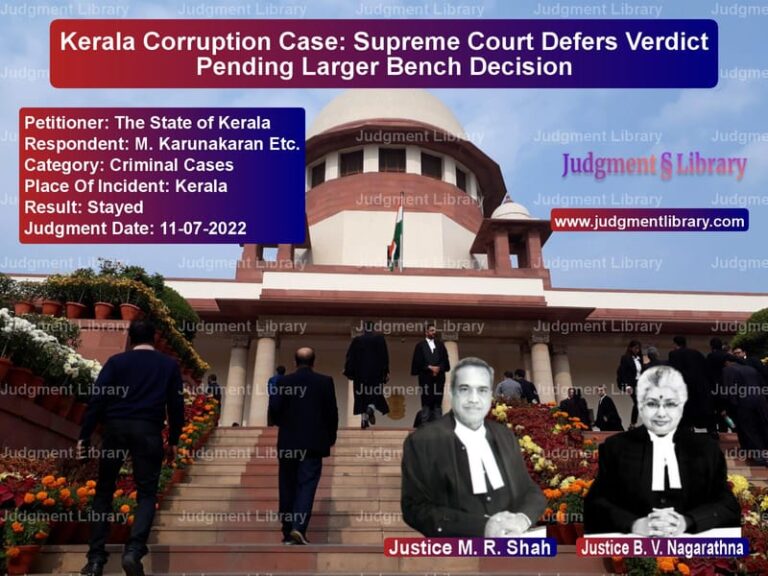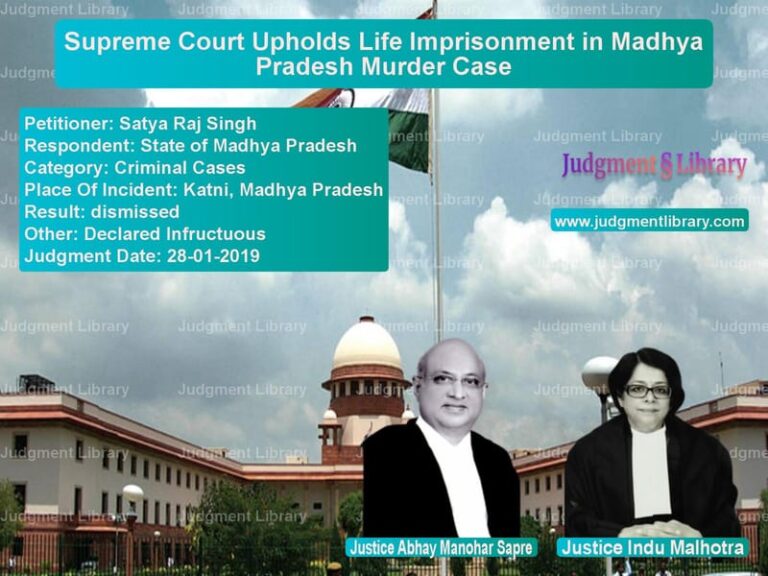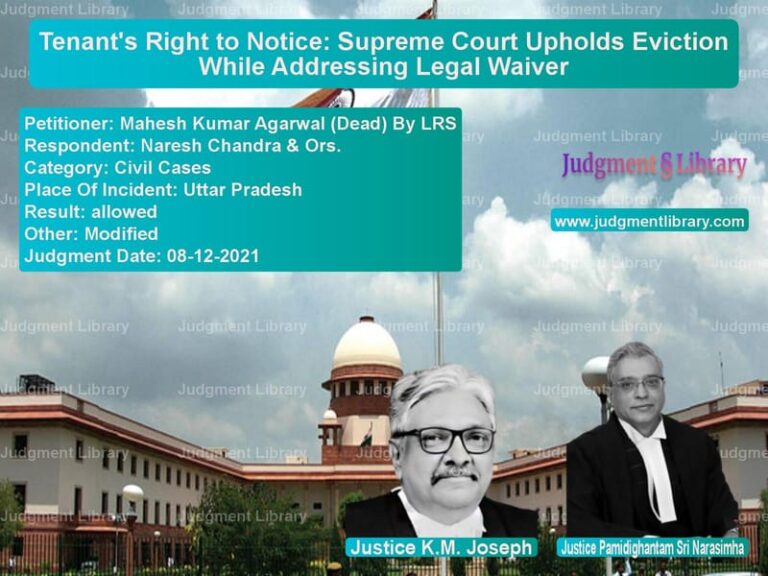Regularization of Part-Time Employees: Supreme Court Quashes High Court’s Directions
The Supreme Court of India, in the case of Union of India & Ors. vs. Ilmo Devi & Anr., addressed an important issue regarding the regularization of part-time employees, particularly contingent paid employees working as Safai Karamcharies (sweepers) for the Postal Department. The case revolved around the question of whether such part-time employees, who had been working for many years, could be regularized and granted parity in pay with full-time employees, despite not working against sanctioned posts.
Background of the Case
The respondents in this case, Ilmo Devi and Babli, were employed as contingent paid part-time sweepers in a post office in Chandigarh. They had been working for many years, with one of them having served since 1982 and the other since 1991. They were paid daily wages for their work, which was limited to five hours a day. Despite their long service, the respondents were not considered for regularization due to the absence of sanctioned posts in the post office where they worked.
The respondents filed a petition before the Central Administrative Tribunal (CAT), seeking regularization of their services as per the guidelines set out in the 2006 Office Memorandum (O.M.), which was based on the Supreme Court’s judgment in Secretary, State of Karnataka v. Umadevi (2006). The O.M. allowed for the regularization of employees working in irregular posts if they had served for over ten years and were duly qualified. The CAT disposed of the petition by directing the Department to advertise for the vacant positions and give the respondents a chance for regularization with age relaxation.
However, the respondents were not satisfied with the decision and filed a writ petition before the High Court, which ruled in their favor. The High Court directed the Union of India to revisit the issue of regularization and complete the exercise of reformulating the policy and sanctioning posts in a phased manner. It further ordered that until this exercise was completed, the respondents should be allowed to continue in service with the current status, and those who had completed 20 years as part-time daily wagers should be granted the minimum basic pay of a Group ‘D’ post from 1st April 2015.
Legal Issues
The key issues before the Supreme Court were:
- Whether the High Court had the authority to direct the creation and sanctioning of posts for the regularization of part-time employees.
- Whether part-time employees working for five hours a day were entitled to the same benefits and pay as full-time employees.
- Whether the directions for regularization and pay parity were sustainable given the absence of sanctioned posts and the nature of their employment.
Arguments Presented
Appellant’s (Union of India) Arguments:
- The respondents were part-time employees who were not working against any sanctioned posts and therefore could not be regularized.
- The Office Memorandum dated 11.12.2006 and the subsequent regularization policy were not applicable to the respondents as they did not meet the necessary criteria, such as working against a sanctioned post or completing 10 years of service as of the cutoff date.
- The High Court erred in directing the creation of posts and regularization of services, as this is a policy decision that lies within the executive domain.
- The respondents were not entitled to parity in pay with full-time workers, as they were part-time employees performing limited duties.
Respondent’s (Ilmo Devi & Babli) Arguments:
- The respondents had been working continuously for many years and were entitled to regularization under the principles of equal pay for equal work.
- Despite being part-time employees, the respondents performed duties comparable to full-time employees, and the authorities could not deny them the benefits of regularization and pay parity.
- The High Court’s directions were justified in light of the respondents’ long service and the need to provide them with fair treatment.
Supreme Court’s Ruling
The Supreme Court ruled in favor of the Union of India, quashing the directions issued by the High Court regarding the regularization and pay parity of the respondents. The Court made several critical observations:
On the Nature of the Respondents’ Employment:
The Court emphasized that the respondents were part-time employees working for less than five hours a day. They were contingent paid employees, and there were no sanctioned posts available in the department for regularization. The Court observed:
“The respondents were employed on a part-time basis without any sanctioned posts in the department. Therefore, their services could not be regularized in accordance with the principles established by this Court in Umadevi’s case.”
On Regularization and Parity in Pay:
The Court clarified that part-time employees cannot claim the same benefits as full-time employees, especially in cases where there are no sanctioned posts. It cited previous rulings that have upheld this principle:
“Part-time employees are not entitled to claim regularization or parity in pay with full-time employees unless they are working against a sanctioned post and have been appointed through a proper recruitment process.”
On the High Court’s Directions:
The Court also addressed the High Court’s directions to create and sanction posts for the respondents, noting that the creation of posts and the formulation of regularization policies are within the domain of the executive. The Court held:
“The High Court exceeded its jurisdiction by directing the creation of posts and formulating a regularization policy. These are policy matters that should be left to the discretion of the government, and judicial interference in such matters is limited.”
On the Regularization Policy:
The Court acknowledged that the Union of India had formulated a regularization policy in 2014, which was in line with the principles laid down in the case of Umadevi. However, the policy could not apply to the respondents as they were not working against sanctioned posts. The Court stated:
“The regularization policy formulated by the Union of India does not apply to the respondents, as they were not working in sanctioned posts, and their employment does not meet the necessary criteria for regularization under the policy.”
Impact of the Judgment
This ruling has significant implications for the employment rights of part-time employees in government departments:
- The decision reinforces that part-time employees cannot claim regularization or parity in pay with full-time employees unless they meet specific criteria, including working against sanctioned posts.
- The judgment limits judicial intervention in executive matters, particularly in the creation of posts and formulation of regularization policies.
- The ruling clarifies the scope of judicial review in cases of regularization and emphasizes the importance of following established policies and criteria for regularization.
Conclusion
The Supreme Court’s decision in Union of India vs. Ilmo Devi reinforces the principle that part-time employees cannot be regularized or granted benefits on par with full-time employees unless they meet specific criteria, such as working against a sanctioned post. The Court’s ruling also highlights the limited role of the judiciary in directing the creation of posts or formulating policies for regularization, underscoring the executive’s discretion in such matters. This judgment will serve as a guiding precedent in future cases involving the regularization of part-time and contingent employees.
Petitioner Name: Union of India & Ors..Respondent Name: Ilmo Devi & Anr..Judgment By: Justice M.R. Shah, Justice A.S. Bopanna.Place Of Incident: Chandigarh, India.Judgment Date: 07-10-2021.
Don’t miss out on the full details! Download the complete judgment in PDF format below and gain valuable insights instantly!
Download Judgment: union-of-india-&-ors-vs-ilmo-devi-&-anr.-supreme-court-of-india-judgment-dated-07-10-2021.pdf
Directly Download Judgment: Directly download this Judgment
See all petitions in Employment Disputes
See all petitions in Public Sector Employees
See all petitions in Workplace Harassment
See all petitions in Judgment by Mukeshkumar Rasikbhai Shah
See all petitions in Judgment by A. S. Bopanna
See all petitions in allowed
See all petitions in Quashed
See all petitions in supreme court of India judgments October 2021
See all petitions in 2021 judgments
See all posts in Service Matters Category
See all allowed petitions in Service Matters Category
See all Dismissed petitions in Service Matters Category
See all partially allowed petitions in Service Matters Category

